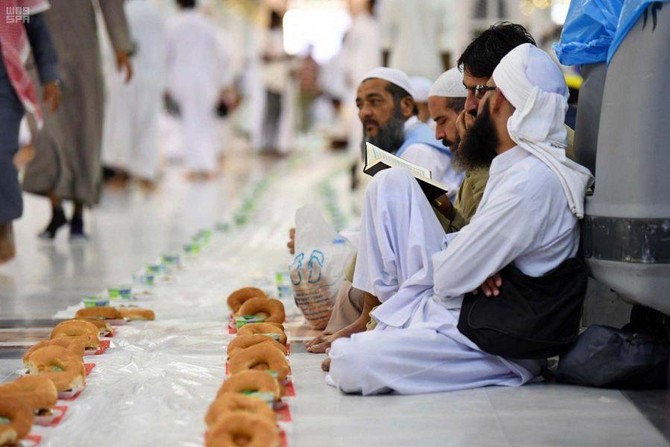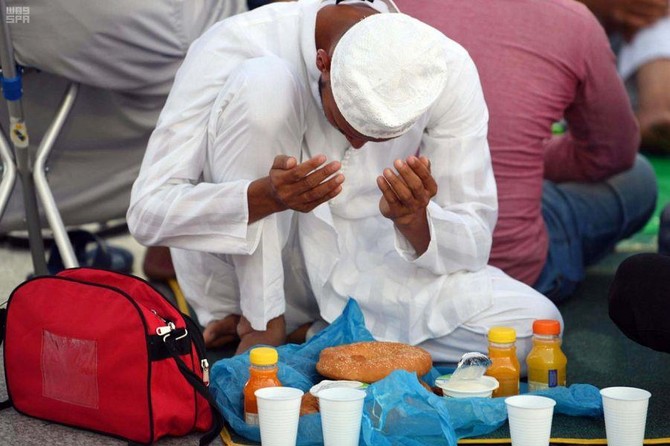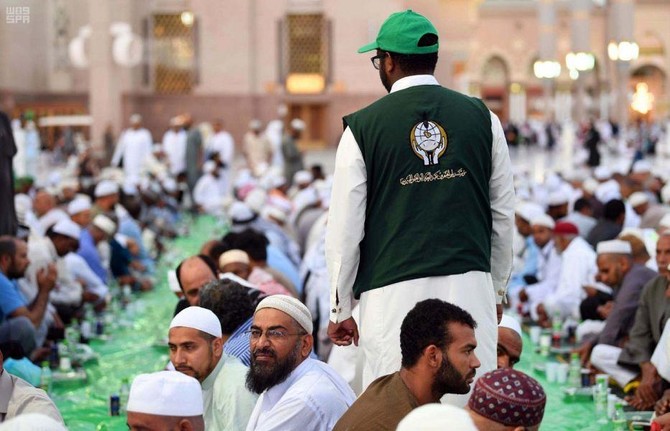JEDDAH: The residents of Madinah have been using the Muslim holy month of Ramadan to take the opportunity to welcome worshippers at Al-Masjid An-Nabawi (the Prophet’s Mosque) and express their hospitality.
Iftar gatherings such as these bring the Madinah community together to socialize and challenge one another in performing good deeds.
The Saudi Press Agency (SPA) took a series of photos that reflect the Ramadan spirit at the Prophet’s mosque, with Madinah residents rushing to serve worshippers Iftar (break fast) meals prepared from the best local cuisine.
A unit dedicated to serving Iftar has provided a guide for those who want to serve meals. Servers are licensed to do so and are fully responsible for the quality of food. Any violations would result in canceling the license and giving the opportunity to another company.
The Iftar meals during Ramadan include tea, coffee, yogurt, bread, rice, meat, fruits and juices.
The food is served in areas of the mosque’s outside courts, designated for fasters to realx and enjoy their meals.
The Iftar meals are prepared right after Asr prayers, and organizers enter the mosque from special gates assigned to accomplish these tasks.
Food inspectors ensure that nothing but the permitted meals are allowed to be served for worshippers.
At sunset prayers, the meals are prepared, and right before prayers are held, the meals are distributed to provide space for worshippers to pray.
How Madinah residents prepare Ramadan meals at Prophet’s mosque
How Madinah residents prepare Ramadan meals at Prophet’s mosque

Saudi inventor wins two gold medals at Mideast International Invention Fair

- Khudry was recognized for inventing a device designed to filter materials and recycle used liquids
- The innovation aims to improve efficiency in liquid purification and reuse
RIYADH: Saudi inventor Duaa Nizar Khudry won two gold medals at the 16th International Invention Fair in the Middle East (IIFME), held in Kuwait from February 8 to 11, the Saudi Press Agency (SPA) reported.
Khudry was recognized for inventing a device designed to filter materials and recycle used liquids, an innovation aimed at improving efficiency in liquid purification and reuse. The technology has potential applications in environmental protection, industrial processing, and water conservation, particularly in regions where sustainable resource management is critical.
A member of the Mawhiba Alumni Program, Khudry represented Saudi Arabia with the support and nomination of the King Abdulaziz and His Companions Foundation for Giftedness and Creativity (Mawhiba), which was participating in the fair for the third time.
She received her first gold medal from the fair’s organizers and was also awarded the IFIA Best Invention Award by the International Federation of Inventors’ Associations, recognizing her innovation as one of the most outstanding entries in the exhibition.
The IIFME, organized annually by the Kuwait Science Club since its launch in 2007, is regarded as one of the region’s largest specialized invention exhibitions and a major platform for inventors to present their work to international audiences.
As a student, Khudry won first place nationwide at the National Olympiad for Scientific Creativity (Ibdaa) in 2013 for the same recycling device, competing against tens of thousands of students across the Kingdom. She later obtained an official patent for the invention in 2024, strengthening its scientific and commercial potential.
She studied chemistry and is currently pursuing graduate studies in materials science and engineering under the Custodian of the Two Holy Mosques Scholarship Program. Her research focuses on environmental sustainability, advanced materials, and liquid purification technologies.
















